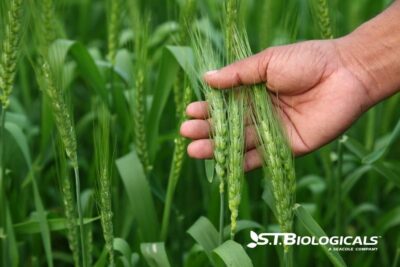Conventional farming with fertilizers and irrigation creates high concentrations of salts and other nutrients, such as phosphorus. These imbalances lead to lower yields and unhealthy plants.
But biological soil inputs, known as biologicals, enhance soil health, nutrient availability, and plant growth. By incorporating biologicals in your planting plan, you can mediate some of the damage caused by past practices and improve farm profitability. Biologicals play a crucial role in remediating worn-out, conventionally farmed soil in several ways.
1. Fix Nitrogen
Bacteria such as Rhizobium form symbiotic relationships with legumes, soybeans, black beans, peas, peanuts, lupins, fava beans, and alfalfa. They convert atmospheric nitrogen into a form plants can use.
2. Extend Root Systems
Mycorrhizal fungi establish mutualistic relationships with plant roots. The fungal hyphae extend far from a plant’s root system and access water and nutrients for the plant. In exchange, the plant provides sugars to the fungi.
3. Convert Insoluble Phosphorus
Certain microbes, called phosphate solubilizing microbes, release enzymes that convert insoluble phosphorus in the soil into a plant-available form. This expands plant root systems and makes them healthier.
4. Accelerate Crop Residue Decomposition
Decomposing microbes break down crop residue, including corn stubble, into simpler compounds. This process adds nutrients to the soil for next year’s crop. This reduces the need for synthetic inputs and sets your farm up for higher profits and greater resilience.
5. Suppress Disease
Beneficial microbes produce antibiotics and compete with pathogens for soil space. Given half a chance, the beneficials will win, resulting in enhanced plant health and less disease pressure.
6. Bioremediate Toxins
Microbes can break down pollutants and toxins in the soil, improving soil quality and making it safer for plant growth.
7. Perform Long-Term for Free
The microbes perform a lot of the nutrient cycling for plant uptake for free. As you incorporate microbial populations in your ag operation season after season, the better plant growth you’ll see.
These are some of the benefits of biologicals in a planting plan. Incorporating biologicals into your operation can reduce your need for fertilizers, prevent disease, and decrease insect pressure. ST Biologicals offers several biologicals for use on conventional as well as organic farms. Our mentors will work with you to determine what your soil needs. We’re here to help you succeed. When soil speaks, we listen.

